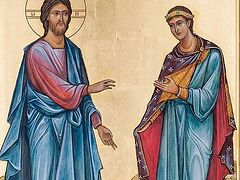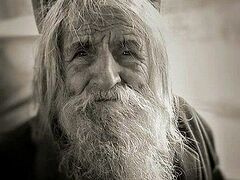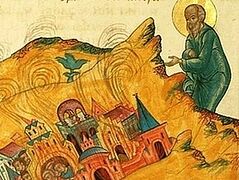We hear the story of the rich man, of the sorrows of a man who was afraid of hoping only in God. This rich man had everything; there was only one thing he lacked—grace. Doesn’t he remind us of many of us who observe everything, keep the rules of the Church, honestly living a strict life, sometimes even too strict with regards to ourselves?
The rich man in the Gospel in any case evokes sympathy. When Christ names all the commandments: Thou shalt do no murder, Thou shalt not commit adultery, Thou shalt not steal, Thou shalt not bear false witness, honour thy father and thy mother: and, Thou shalt love thy neighbour as thyself, the youth replies, All these things have I kept from my youth up. As it says in the Gospel according to Mark, Christ beheld him and loved him. But he makes him an unheard-of proposal. He proposes a complete break with his wealth—not only material but also spiritual. It’s not that the Lord canceled for him the commandments in which life consists. To the contrary, He points to them as the only path to perfection—that is, love. But man cannot attain to perfections though his own efforts. To this man, who was used to counting only on his own efforts and his own riches, Christ suddenly offers everything for free—all His love, all His perfection: “Leave everything and follow Me.”
We know that eternal life can’t be earned by any labors or ascetism; no one can conquer death and sin, become a “partaker of divine nature” and a temple of the Holy Spirit. Nevertheless, how often we are like one of St. Ignatius (Brianchaninov’s) correspondents, who couldn’t understand why, after having scrupulously prepared for confession, trying to life strictly and attentively, named all her sins including the most trifling, she nevertheless departed from the church empty and joyless. “This happened,” the saint answered her, “because you thought you would quickly pay off all your debts to God, while in fact your debts are unpaid.”
Eternal life means abiding with God, and it all consists of coming to know that Christ is God, and following Him on the path of His commandments. All commandments exist in order for us to learn to have a personal relationship with God and people—that is, love. So that God and people would become alive to us. “I have observed all that”, says the young man, but his relationship with God and people is completely egoistic. He is captive to his property, both material and spiritual. He is in chains, and those chains must be broken.
Eternal life is the life that Christ God lives. It is love and dedication, and sacrificial generosity. If we learn what eternal life is here, on earth; that this peace and joy comes from Christ, we will joyfully follow after Christ. And we will understand that following after Christ means serving people, for whom Christ died.
Let each one of us test himself today and see what kind of sorrow and joy is within him, and what their causes are. The rich man could not resolve to sell everything he had, to separate himself from it. This explains the sorrow with which he lowered his head and left Christ. It was sorrow because he did not have the strength to accept the joy offered to him. Joy is only given to the poor in spirit. Only to those who humbly pray for grace, following after Christ. The youth sorrowed because he could not obtain perfection through his own heavy price, and yet he turned down Christ’s easy offer.
But if such a man perishes, we can’t help but exclaim with all Christ’s disciples—Who then can be saved? Christ answers, With men this is impossible; but with God all things are possible. We should never despair. In these words are hidden the Savior’s mercy regarding the rich young man who was walking away from Him. It’s not impossible for God to return him as well. But there is only one law—to sooner or later willingly leave all and receive the freely-given grace.
The path to heaven is for everyone a narrow path, and the gates leading to life are straight. It is easier for a camel, says Christ, to go through the eye of a needle, than for a rich man to enter into the kingdom of God. Some suppose that He is speaking here of the gates to Jerusalem that were called “Eye of the needle” because of their narrowness. A camel cannot pass through them until it is unloaded. Thus, a rich man cannot ascend to heaven until he desires to take leave of the load of his earthly riches and bow down before the ordinances of humble faith.
Others consider that it is no coincidence that the word “camel” in Greek sounds like the word for “rope”. A rich man in comparison with a poor man is like a thick rope in comparison with a thin thread. And it will not pass through the eye of a needle until you break it down into separate threads. So the rich man must free himself from his riches in order to pass thread by thread through the eye of the needle.
Where can we get the courage and self-sacrifice of those who left everything and went to the desert, or died a martyr’s death? Has it been so long since our Church was on the cross, when all those faithful to the Lord hoped only in grace, and deprived of everything, possessed nothing other than treasure in heaven? But everyone without exception is given death as either the loss of everything, or as the Pascha of the Lord.




